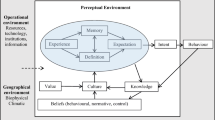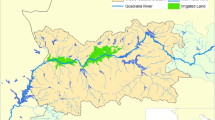Abstract
Climate change is a geophysical reality, water deficit is a natural reality whereas risk community is a social reality. The interconnectivity between the three is intense with each variable having a chain reaction with the other two. Studies on climate change and water scarcity are abundant and are taking an escalating trend. But there is a dearth of literature relating to the interlinkage of the aforesaid variables. So, this has become the backdrop of the present article. The paper is fully backed by secondary literature and has taken its parameters to look at the individual phenomenon and establish its connectivity. The study areas selected are the Bolangir and Bargarh districts of Odisha, which encounter acute water stress for agricultural and domestic purposes. No such research study is found to date. Thus, the paper has tried to establish how climate change is rapidly taking place bringing water scarcity and stress is responsible for generating risk communities. Finally, the article culminates with certain ways forwards to bring solutions to such issues.



Similar content being viewed by others
References
Abedin, M. A., Collins, A. E., Habiba, U., et al. (2019). Climate change, water scarcity, and health adaptation in southwestern coastal Bangladesh. International Journal of Disaster Risk Science, 10(1), 28–42. https://doi.org/10.1007/s13753-018-0211-8
Ade, V. V. (2021). Trends and causes of farmers suicide in Maharashtra State, India. International journal of scientific research in science, engineering and technology, 8(1), 248–261.
Agudo, P. A. (2022). Climate change and the human rights to water and sanitation Special Thematic Report 2: The impacts of climate change on the human rights to safe drinking water and sanitation of groups and populations in situations of vulnerability, The Office of the United Nations High Commissioner for Human Rights. https://www.ohchr.org/sites/default/files/2022-01/climate-change-2-friendlyversion.pdf.
Aguileraera, J. (2019). Water is running out in this Indian City, Causing Crisis Time. https://time.com/5611385/india-chennai-water-crisis
Ahmed, A. U., Appadurai, A. N., & Neelormi, S. (2019). Status of climate change adaptation in South Asia region. In M. Alam, J. Lee, & P. Sawhney (Eds.), Status of climate change adaptation in Asia and the Pacific (pp. 125–152). Cham: Springer.
Balasubramanya, S., & Stifel, D. (2020). Viewpoint: water, agriculture and poverty in an era of climate change: why do we know so little? Food Policy, 93, 101905. https://doi.org/10.1016/j.foodpol.2020.101905
Behera, P. (2003). Heavy minerals in beach sands of Gopalpur and Paradeep along Orissa Coastline, East Cost of India. Indian Journal of Marine Sciences, 32(2), 172–174.
Behere, P. B., & Bhise, M. C. (2009). Farmers’ suicide: Across culture. Indian Journal of psychiatry, 51(4), 242.
Blue, G. (2016). Framing climate change for public deliberation: What role for interpretive social sciences and humanities? Journal of Environmental Policy & Planning, 18(1), 67–84.
Breakwell, G. M. (2014). The psychology of risk. Cambridge University Press.
Central Ground Water Board. (2017). Dynamic ground water resources of India. Central Ground Water Board.
Chengappa, Raj (2021). The Great Indian Thirst: The Story of India's Water Crisis, Solutions to Tackle it, India Today, March 20.
Choudhury, Pranab R., et al. (2012). water conflicts in Odisha: A compendium of case studies. Forum for Policy Dialogue on Water Conflicts in India.
CNA Military Advisory Board. (2018). The role of water stress in instability and conflict, environmental change and security program. CNA Military Advisory Board.
Colombia Water Centre Report (2019).
Desinayak, N. (2021). Asserting the depleting groundwater condition in coastal region and its relation to river system by using remote sensing and GIS: A case study of Rushikulya River Basin, Odisha, India. Journal of the Indian Society of Remote Sensing, 50(1), 55–71. https://doi.org/10.1007/s12524-021-01456-w
Eckstein, Gabriel. (2009). Water scarcity, conflict, and security in a climate change world: Challenges and opportunities for international law and policy. Heinonline.
Falkenmark, M., Lundqvist, J., & Widstrand, C. (1989). Macro-scale water scarcity requires micro-scale approaches. Natural Resource Forum, 13(4), 258–267. https://doi.org/10.1111/j.1477-8947.1989.tb00348.x
Giné Garriga, R., & Pérez Foguet, A. (2013). Water, sanitation, hygiene and rural poverty: Issues of sector monitoring and the role of aggregated indicators. Water Policy, 2013(15), 1018–1045.
Global Water Partnership (2017). Annual Report of GWP in Action. https://www.gwp.org/globalassets/global/about-gwp/publications/annual-reports/gwp-annual-report-2017.pdf.
Gupta, Anshuman (2021). 9.1 crore Indians don’t have a basic water supply. But India isn’t paying attention, The Print, October, 27th.
Hoda, A., Gulati, A., Wardhan, H., & Rajkhowa, P. (2021). Drivers of Agricultural Growth in Odisha. In A. Gulati, R. Roy, & S. Saini (Eds.), Revitalizing indian agriculture and boosting farmer incomes. India Studies in Business and Economics.
High and Dry: Climate Change, Water, and the Economy (2016). World Bank. https://www.worldbank.org/en/topic/water/publication/high-and-dry-climate-change-water-and-the-economy.
Islam, Md., & Kieu, Edson. (2021). Sociological perspectives on climate change and society: A review. Climate, 9(1), 7. https://doi.org/10.3390/cli9010007
Panthi, J., Khatiwada, K. R., Shrestha, M. L., & Dahal, P. (2018). Water poverty in the context of climate change: a case study from Karnali river basin in Nepal Himalaya. International Journal of River Basin Management, 17(2), 243–250. https://doi.org/10.1080/15715124.2018.1531421
Kujur, R. (2019). Underdevelopment and patterns of labour migration: A reflection from Bolangir district, Odisha. The research journal of social sciences, 10(1), 209.
Manandhar, S., Pandey, V. P., & Kazama, F. (2012). Application of water poverty index (WPI) in Nepalese context: A case study of Kali Gandaki River Basin (KGRB). Water Resources Management, 26(1), 89–107.
McMichael, A. J. (2013). Globalization, climate change, and human health. New England Journal of Medicine, 368(14), 1335–1343.
Mekonnen, M. M., & Hoekstra, A. Y. (2016). Sustainability: Four billion people facing severe water scarcity. Science Advances, 2(2), 1–7. https://doi.org/10.1126/sciadv1500323
Misra, A. K. (2014). Climate change and challenges of water and food security. International Journal of Sustainable Built Environment, 3(1), 153–165.
Mukheibir, P. (2010). Water access, water scarcity, and climate change. Environmental management, 45(5), 1027–1039.
Muta’ahellandendu, J. (2012). Health implications of water scarcity in Nigeria. European Scientific Journal, 8(18), 111–117.
Shadananan Nair, K. (2020). Climate change and water: Ripple marks. Down to Earth’s print edition.
Nemeth, D., & Olivier, T. (2017). Innovative approaches to individual and community resilience: From theory to practice (pp. 1–23). Academic Press.
Odisha District gazetteers, Baragarh (2018). Gopabandhu Academy of Administration [gazetteers unit] general administration department government of Odisha, pg. 26.
Odisha District Gazetteers, Bolangir (2015) Gopabandhu academy of administration [gazetteers unit] General Administration Department, Government of Odisha, p. 33
Orissa Post (2020). 10 Lakh Migrants Return to Odisha. Retrieved on 25th Nov, 2020, from https://www.orissapost.com/10-lakh-migrants-returned-to-odisha/.
Orr, S., & Pegram, G. (2014). Business strategy for water challenges: from risk to opportunity (1st ed.). Routledge. https://doi.org/10.4324/9781351274449
Pradhan, A. (2016). Number of migrant laborers in Odisha rise three-fold in 10 years. Retrieved Dec, 2016, from https://timesofindia.indiatimes.com/city/bhubaneswar/number-of-migrant-labourers-from-odisha-rise-three-fold-in-10-years/articleshow/55911040.cms.
Tapela, B. M. (2012). Social water scarcity and water use.
Tewari, S., Bapat, R. (2016). One in four rural Indian households walks more than 30 minutes to get water. Retrieved June, 2016, from https://scroll.in/article/810363/the-great-indian-water-walkathon.
UNICEF (2021). Water, Sanitation and Hygiene (WASH). https://www.unicef.org/wash
UN World Water Development Report (2022). https://www.unwater.org/publications/un-world-water-development-report-2022
Van Vliet, M., et al. (2021). Global water scarcity including surface water quality and expansion of clean water technologies. Environmental Research Letters, 16(2), 024020.
World Bank. (2019). Quality unknown: The invisible water crisis. World Bank Publications.
Author information
Authors and Affiliations
Corresponding author
Ethics declarations
Conflict of interest
The authors of this article do not have any Conflict of Interest to disclose.
Rights and permissions
Springer Nature or its licensor (e.g. a society or other partner) holds exclusive rights to this article under a publishing agreement with the author(s) or other rightsholder(s); author self-archiving of the accepted manuscript version of this article is solely governed by the terms of such publishing agreement and applicable law.
About this article
Cite this article
Sahoo, A., Rath, N. Assessment of climate change, water poverty and risk communities: some insights from Western Odisha. GeoJournal 88, 3665–3678 (2023). https://doi.org/10.1007/s10708-022-10819-w
Received:
Revised:
Accepted:
Published:
Issue Date:
DOI: https://doi.org/10.1007/s10708-022-10819-w




